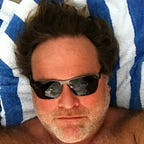The Word I Couldn’t Leave
I didn’t know how obsessed I was with world — with the actual word world — until I went through a book of poems and saw that I used the word at least 30 times. To confess, however, 30 times came to me by another poet, and so, of course, I had to go back and count the words myself (because they were my words and not his words) to see if this was true. I’d never done anything like that — count how many times I used a word in a book. It felt OCDesque. Do other writers do this?
Thirty times is a lot of instances of world in my book then, we were still living. And when I looked at the poetry that way — when I sieved through language and the pages it filled until a single word dropped through — I saw world and its use, not only as a liability or sort of generic obsession. But as the literary equivalent of a facial tick. The five letters making up the one word came together in my brain like a joke-equation.
Where had my imagination gone?
Why was I driving my truck into the same dumb tract of mud so many times?
WORLD.
My tires were stuck in it and now and until the 30th or 30th-something time.
My eyes were glazed. I got stoned on a word I couldn’t leave.
* * * * *
There are many ways to look into a poem, particularly when it’s your poem. I don’t think readers are very interested in reading a poem more than the one way they read it, excluding maybe reading it twice. But writers almost always have to look in different directions (the way a chameleon can move each turret-like eye independently), or they wouldn’t get any revising done. Revising a poem goes from East to West across the page, and also North to South up and down the page.
I know that looking for cases of world (or, if your tick is desire, love, or star or sky) in anybody’s poem isn’t a good way to look at poems because when that happens, you aren’t reading poetry, you’re looking at it. When I turned away from looking at the 30th instance of world, I realized — and not too unhappily — that at its most open-heartedness, my book was, indeed, precisely about the word it kept repeating. My book was about loving something too large and too dangerous to hold in my, in yours, in our hands. My book was about how much of the world — in re-considering Wordsworth’s the world is too much with us — we could we bare.
This sudden knowledge seemed like an essential aspect of this second book I wrote, because my previous book, 1990, had been way more about the “I.” With the new look at so many world occurrences, then, we were still living seemed beyond (if that’s the right word) the knowledge in the first book. The second book was looking past one’s sense of being and more toward one’s sense of time, of history. The self, dropping the “I,” becomes a moving part in a larger body.
Since the time I counted how many times I used a particular word in a book of poems, I’ve gone to other books and found that there are (not surprisingly) certain words that get repeated over and over again: light, love, body, life, star(s), dream. And, of course, world — world, again! Shamelessly, idiotically. Could these common words we use to build a kind of lexicon into books of poetry be the first words that civilization used to say, look! Who are we? What are we? Where are we?
So I discovered my first book of poems, 1990, uses the word light a lot. I know from counting how many times world appeared in the second book, that light probably appears just as many times in the first book. So I didn’t bother counting exactly how many times light appears. It suddenly seemed like a foolish enterprise that only could build a case for my being a fraud. But what I do know is that my particular version of a Book of Light was a book I had already written. Even if it still feels like a book, I have to write.
